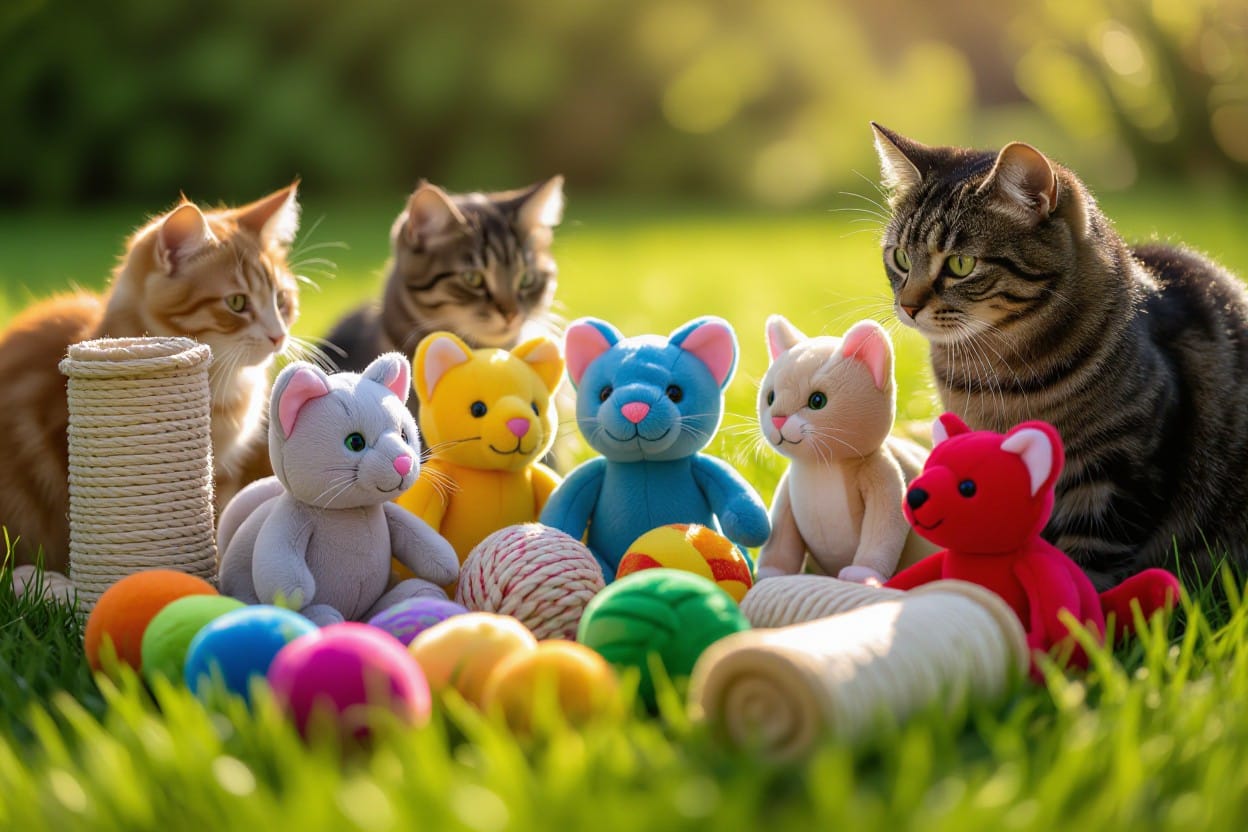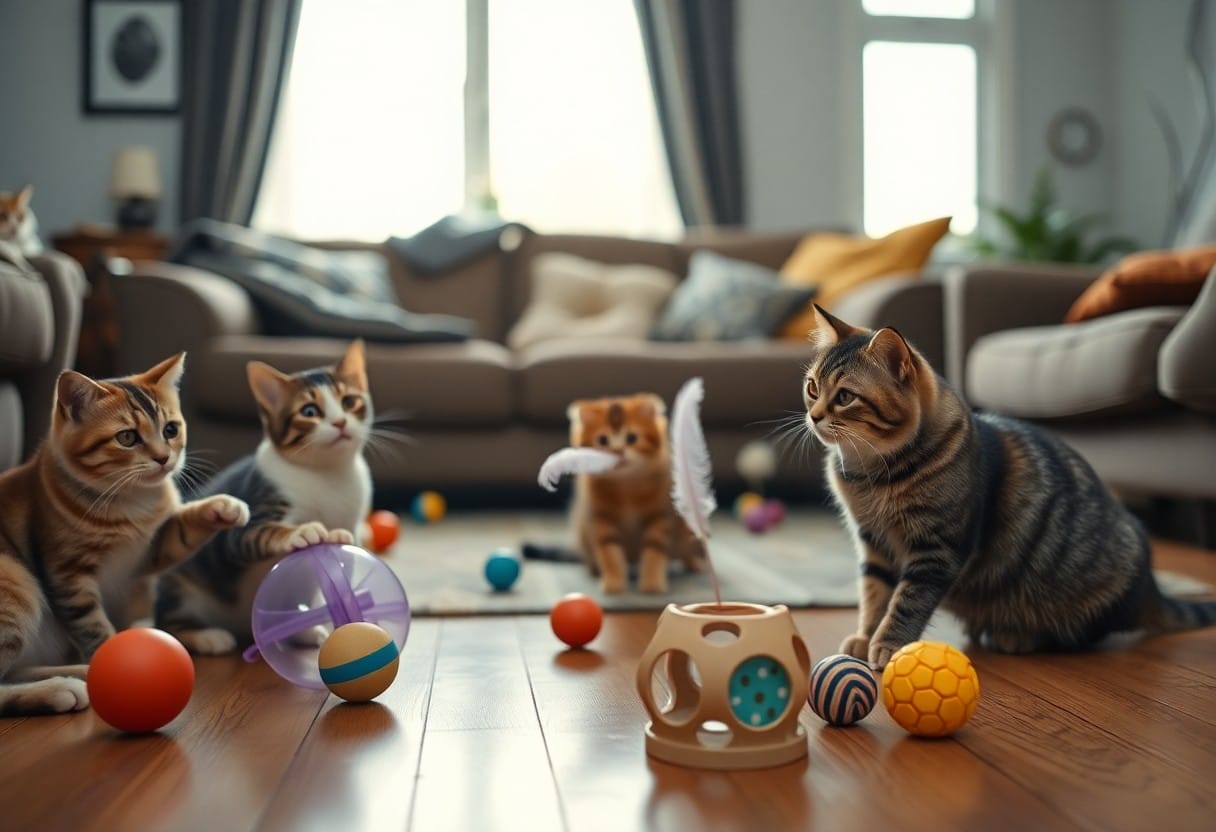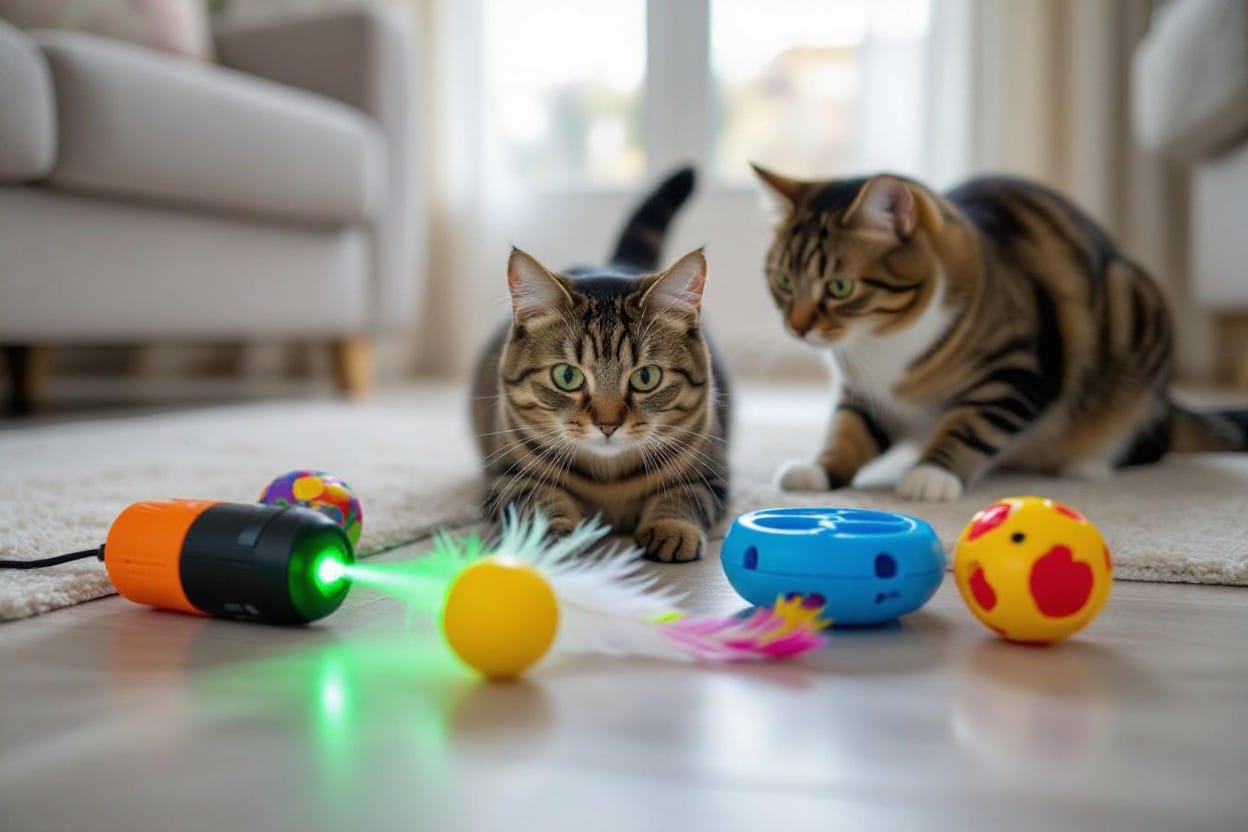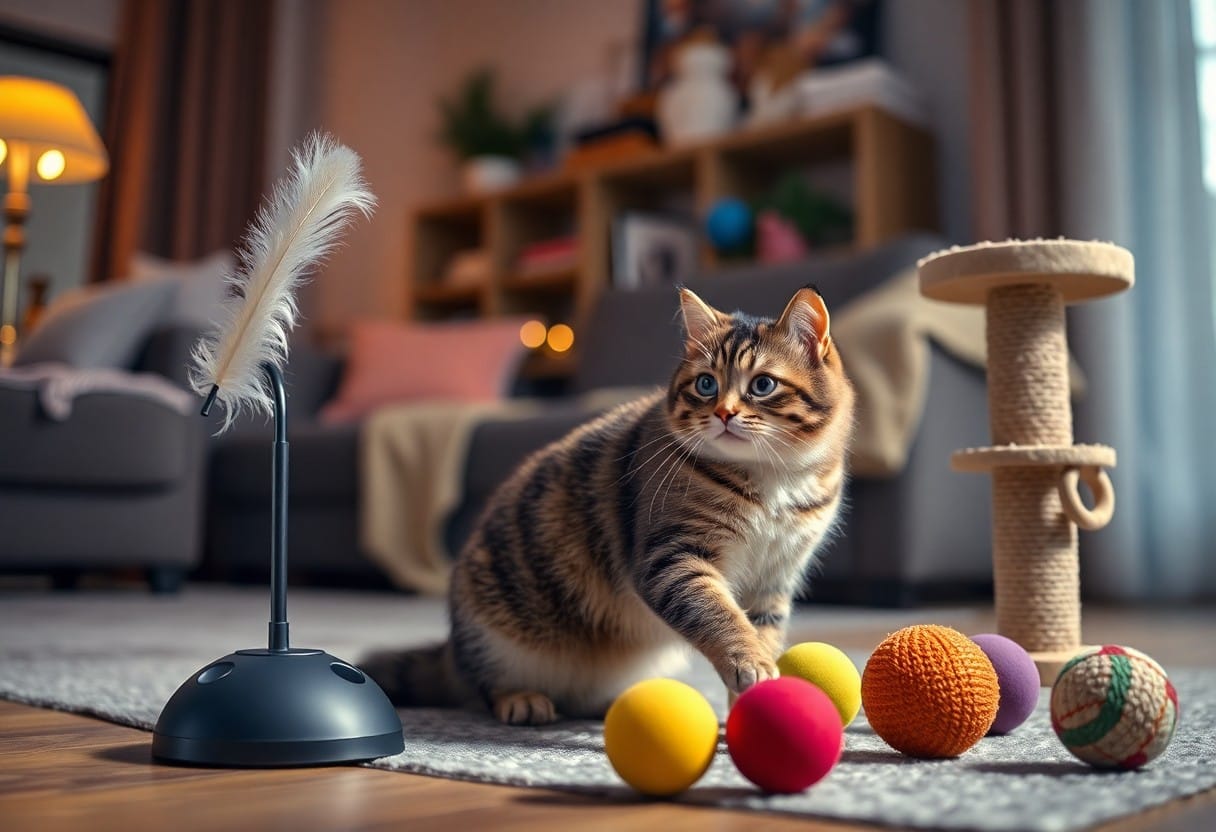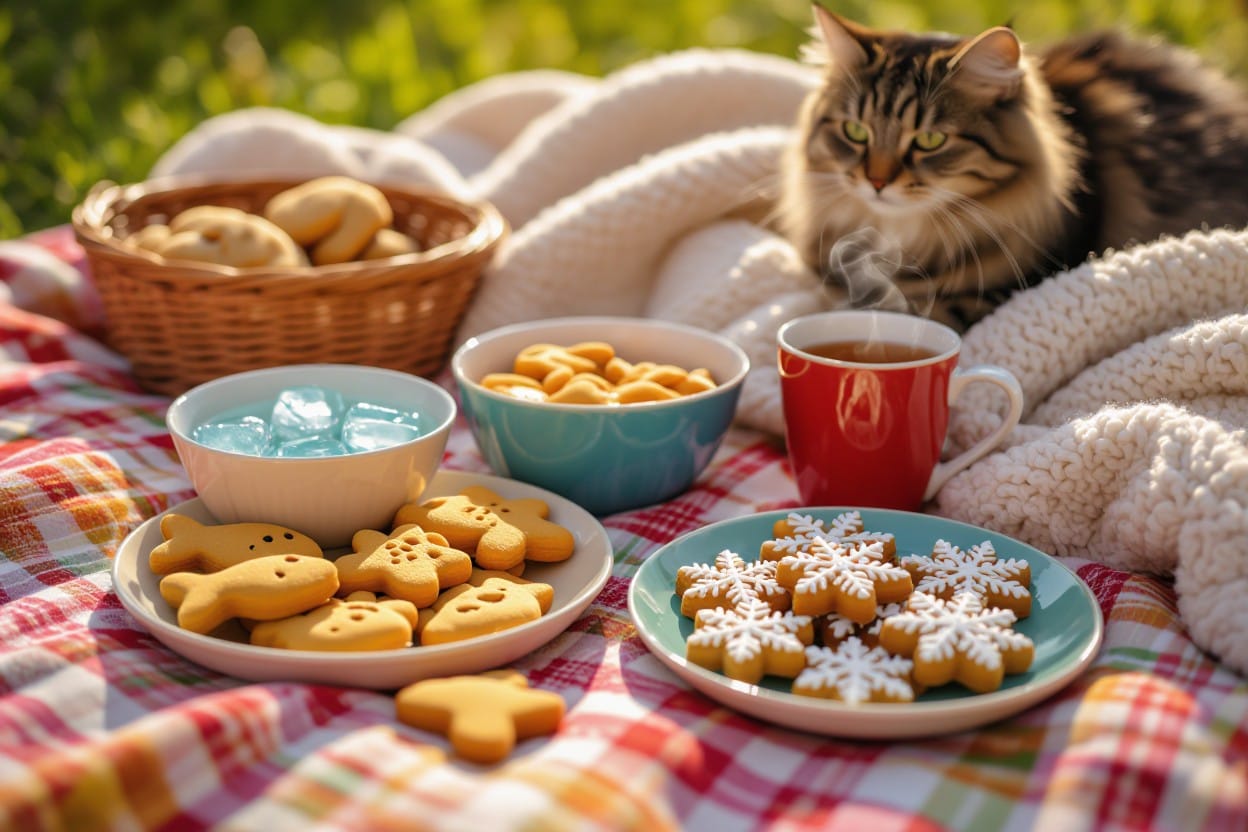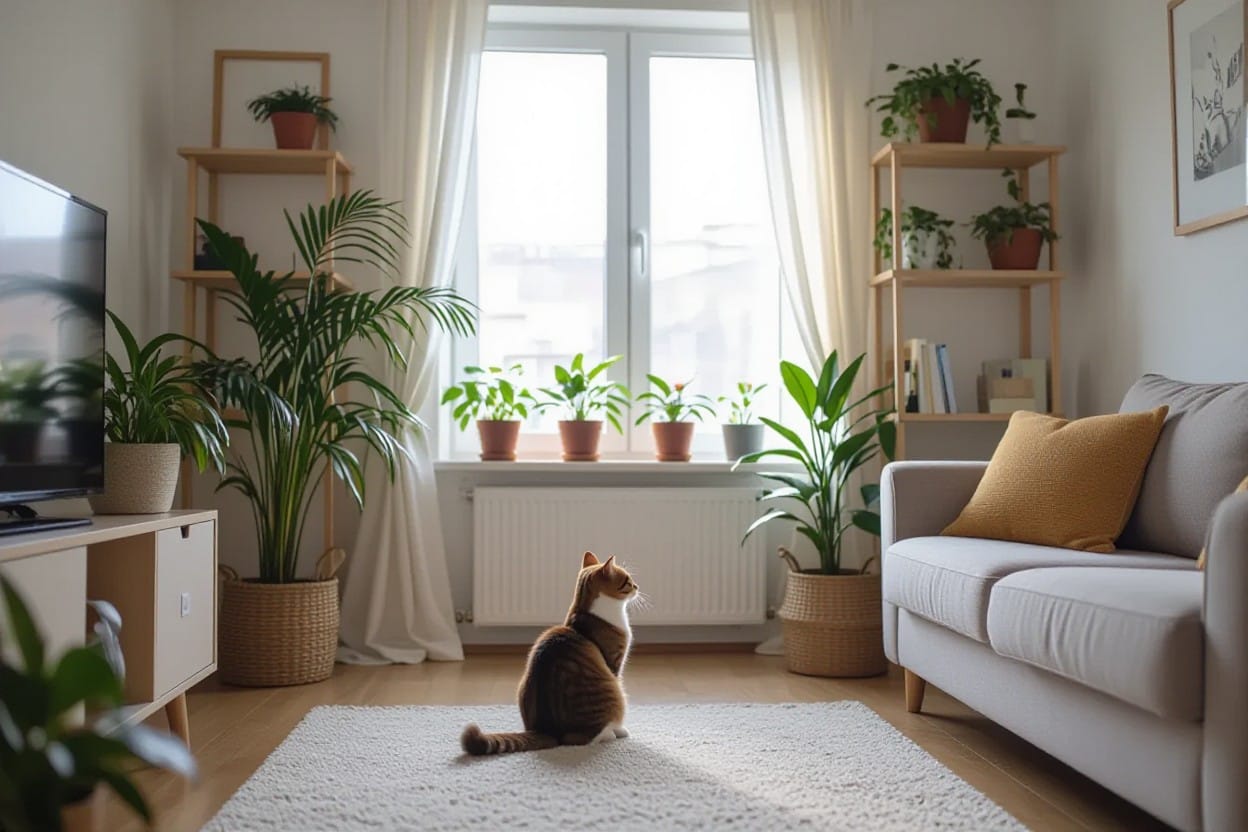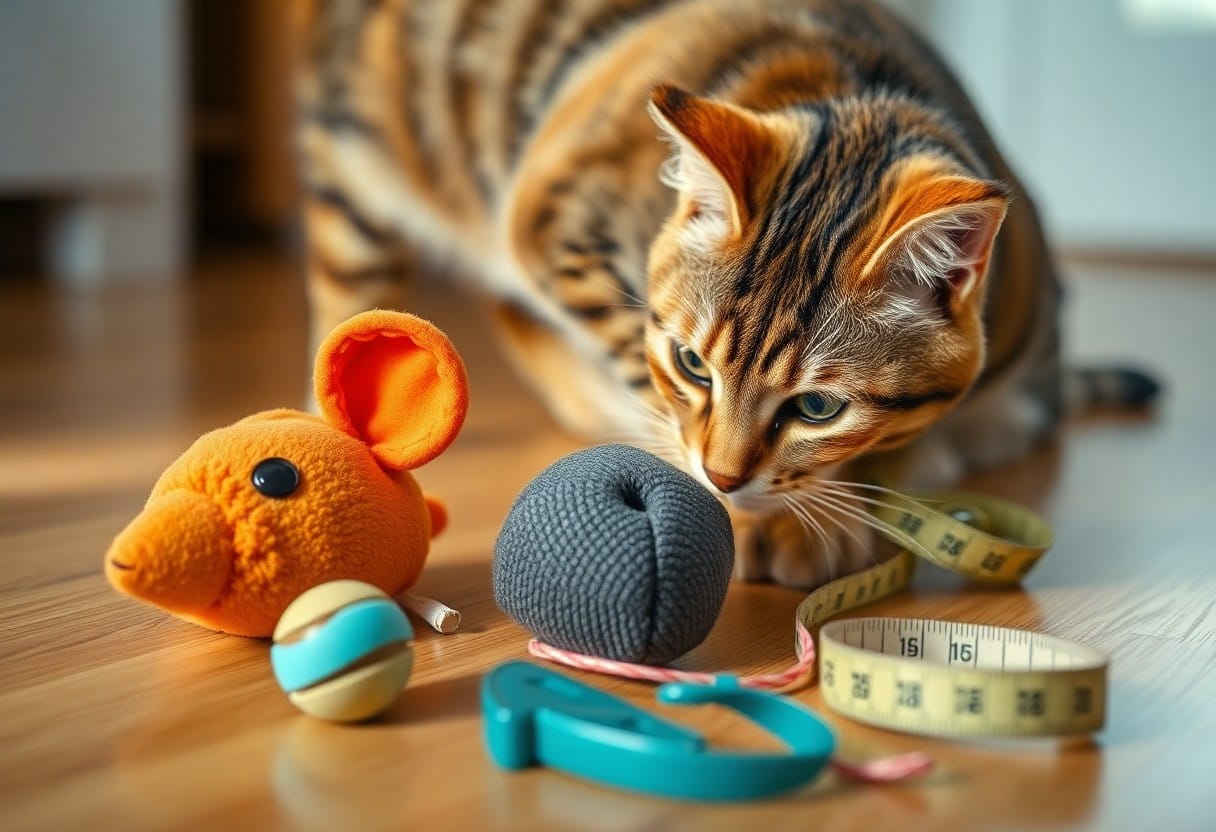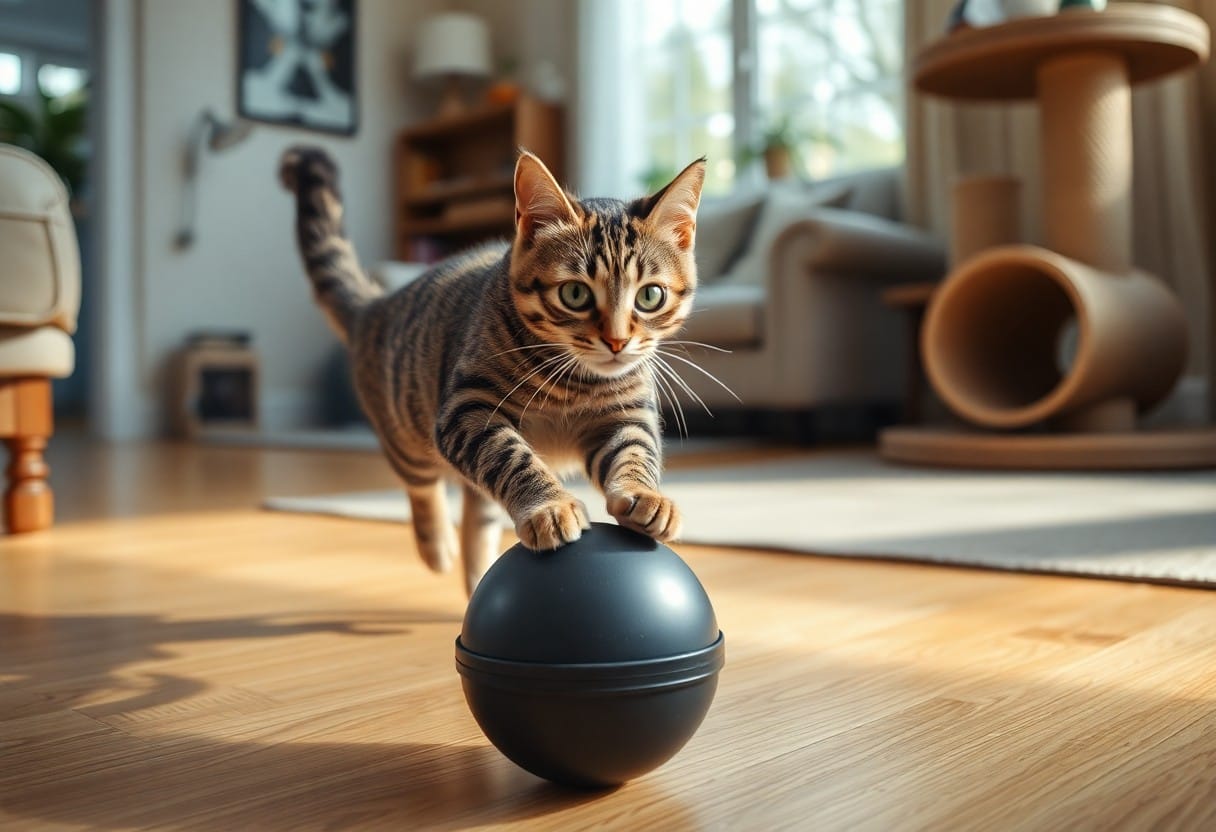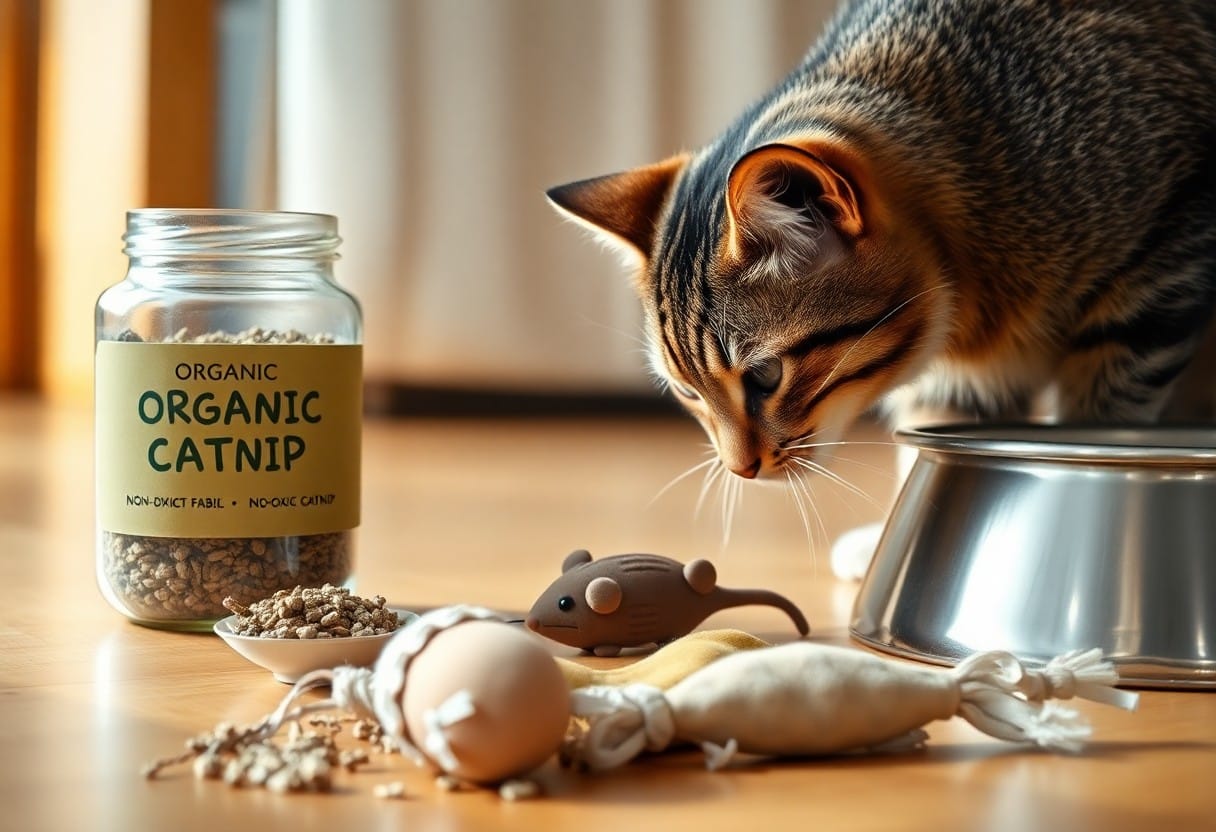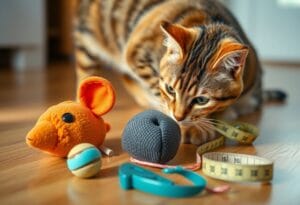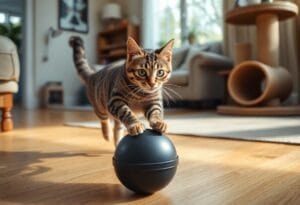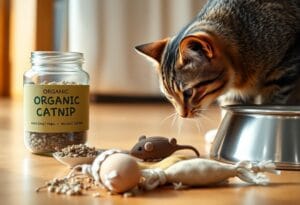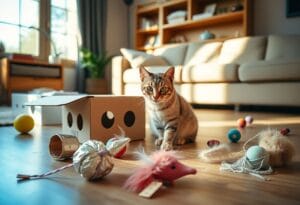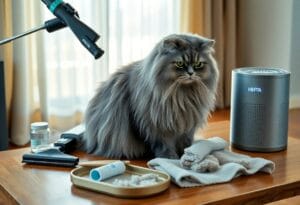Cat owners understand the joy of watching their feline companions play with their favorite toys. However, did you know that regularly rotating your cat’s toy collection can provide numerous benefits for your furry friend? By introducing new toys and rotating them out periodically, you can help keep your cat mentally stimulated, prevent boredom, and encourage physical activity.


Understanding Cat Psychology
There’s a lot to learn about cat psychology when it comes to understanding their behavior and needs. Cats are curious and active animals with specific natural behaviors and play preferences that require stimulation to keep them happy and healthy.
Natural Behaviors and Play Preferences
Understanding your cat’s natural behaviors and play preferences is important for providing the right toys and activities to keep them engaged. Cats have hunting instincts, which is why interactive toys that mimic prey can be very stimulating for them. They also enjoy toys that allow them to pounce, chase, and bat around, satisfying their innate need for play and exercise.
The Role of Novelty and Stimulation
One key aspect of cat psychology is the role of novelty and stimulation in their daily lives. Cats can easily get bored with the same toys and activities, making it important to rotate their toy collection regularly. Introducing new toys and changing up their play routine can help keep them mentally and physically stimulated, preventing boredom and behavioral issues.
Novelty is important for cats as it triggers their curiosity and encourages exploration. By offering a variety of toys that appeal to different senses, such as ones with different textures, sounds, and movements, you can keep your cat engaged and entertained for hours on end.

The Benefits of Toy Rotation
Preventing Boredom and Reducing Stress
Reducing boredom and stress in cats is necessary for their overall well-being. By rotating your cat’s toys regularly, you can keep their environment enriched and engaging. Cats can quickly get bored with the same toys day after day, leading to stress and even behavioral issues. Introducing new toys or rotating existing ones can help prevent boredom and provide mental stimulation.
Encouraging Physical Exercise
With regular toy rotation, you can encourage your cat to stay active and healthy. Cats need physical exercise to maintain a healthy weight and prevent obesity-related health problems. By introducing different types of toys that cater to your cat’s natural instincts, such as hunting or chasing, you can keep them physically engaged and mentally stimulated.
This form of play mimics their natural hunting behaviors, keeping them physically fit and mentally sharp. It also provides an excellent outlet for excess energy, reducing the chances of destructive behavior in the home.
Stimulating Mental Health and Cognitive Abilities
This mental stimulation is crucial for your cat’s overall mental health and cognitive abilities. By rotating toys that offer different challenges, textures, or sounds, you can keep your cat’s mind engaged and prevent cognitive decline. This variety in their environment can also help in preventing conditions such as anxiety or depression.
An enriched environment with rotating toys can boost your cat’s problem-solving skills and keep their brain sharp. It provides them with the mental stimulation they need to stay happy and healthy for years to come.
Enhancing the Cat-Owner Bond
The bond between a cat and its owner can be strengthened through interactive play with rotating toys. Spending quality time engaging in play with your cat can build trust and create a deeper connection. Cats that are mentally stimulated and physically active are more likely to form a strong bond with their owners.
The act of playing with your cat helps build a positive association between you and provides necessary social interaction for their well-being. It can also be a great stress-reliever for both you and your feline companion.
Implementing a Rotation System
Assessing Your Cat’s Toy Preferences
To ensure a successful toy rotation system, start by observing which toys your cat gravitates towards the most. Some cats prefer toys that mimic prey, such as feather wands or interactive mice, while others may enjoy toys that allow them to satisfy their natural instinct to hunt, like puzzle feeders or treat balls. Understanding your cat’s preferences will help you tailor their toy rotation schedule to keep them engaged and entertained.
Creating a Sustainable Rotation Schedule
Your cat’s excitement for their toys can diminish if they are always available. By creating a sustainable rotation schedule, you can keep your cat’s interest piqued and prevent toy fatigue. Consider rotating toys every week or every few days to provide variety and novelty for your feline friend. Keep a designated space to store toys that are not in rotation to keep them fresh and exciting when reintroduced.
Cats are creatures of habit and can quickly become bored with the same toys. By implementing a rotation system, you are not only stimulating your cat’s mind but also providing them with enriching playtime experiences that promote physical and mental well-being.
Tips for Introducing New Toys
When introducing new toys into your cat’s rotation, it’s necessary to do so gradually. Place the new toy in their environment and observe their reaction. You can also rub the toy with catnip or treats to entice your cat to investigate and play. Rotate the new toy in with their existing toys to make the transition smoother and more enjoyable for your furry companion.
- Observe your cat’s reaction to new toys
- Introduce new toys gradually to prevent overwhelming your cat
Any sudden changes to your cat’s toy collection can cause stress or disinterest. By following these tips, you can ensure a seamless transition and keep your cat engaged and entertained with their ever-evolving toy selection.
Tips for Introducing New Toys
When introducing new toys into your cat’s rotation, it’s necessary to do so gradually. Place the new toy in their environment and observe their reaction. You can also rub the toy with catnip or treats to entice your cat to investigate and play. Rotate the new toy in with their existing toys to make the transition smoother and more enjoyable for your furry companion.
- Observe your cat’s reaction to new toys
- Introduce new toys gradually to prevent overwhelming your cat
Tips
Toy Variety and Selection
All cat owners want their furry friends to be entertained, engaged, and mentally stimulated. One way to achieve this is by providing a variety of toys in your cat’s collection. Different types of toys offer unique benefits and cater to various aspects of your cat’s instincts and interests.
Different Types of Cat Toys
- Interactive toys encourage physical activity and engagement
- Feather toys tap into your cat’s natural hunting instincts
- Puzzle toys provide mental stimulation and challenge
- Chase toys satisfy your cat’s need for play and exercise
- Scratching posts promote healthy scratching behavior and maintain nail health
Knowing your cat’s preferences and tendencies can help you select the most suitable toys for them. By rotating different types of toys, you can keep your cat entertained and prevent boredom.
Interactive Toys and Their Impact
Impactful interactive toys can enhance the bond between you and your cat while promoting physical activity and mental stimulation. These toys often require your cat to engage in play, helping them stay active and maintain a healthy weight.
Another benefit of interactive toys is that they can alleviate boredom and reduce stress in indoor cats. By providing toys that mimic hunting and play behaviors, you can fulfill your cat’s natural instincts and prevent behavioral issues caused by pent-up energy.
Safety Considerations When Choosing Toys
For the safety of your cat, it is crucial to select toys that are appropriate for their size and behavior. Always supervise your cat during playtime to prevent accidents or ingestion of small parts. Avoid toys with sharp edges, strings, or small pieces that could pose a choking hazard.
Their well-being should always be the top priority when choosing toys for your feline friend. Regularly inspect toys for wear and tear, and replace them when they show signs of damage to prevent any potential harm. By selecting safe and engaging toys, you can provide your cat with hours of fun and stimulation while keeping them out of harm’s way.
Dealing with Potential Challenges
Toys Being Ignored or Rejected
Keep an eye on your cat’s toy preferences, as they may change over time. If you notice that certain toys are consistently being ignored or rejected, try introducing new toys that offer a different texture, sound, or movement to pique their interest. Cats can be finicky creatures, so it’s important to rotate their toys regularly to keep them engaged and entertained.
Managing Multiple Cats and Toy Preferences
Rejected toys can lead to potential conflicts in households with multiple cats. Some cats may prefer certain toys over others, causing disputes over who gets to play with what. To prevent toy-related disagreements, try providing each cat with their own set of toys that cater to their individual preferences. This can help minimize competition and ensure that each cat gets equal time with their favorite toys.
Plus, rotating the toys among cats can keep things fresh and exciting for everyone. It’s a good idea to observe each cat’s interactions with different toys and make adjustments as needed to accommodate their preferences.
Keeping the Toy Collection Fresh and Exciting
Collection
Exciting
Advanced Strategies for Toy Rotation
Unlike sticking to the same old toys for your feline friend, advanced strategies for toy rotation can bring new excitement and engagement to their playtime. Here are some advanced techniques to enhance your cat’s toy rotation:
Seasonal and Themed Rotations Rotation Consider rotating your cat’s toys based on the seasons or introducing themed rotations for special occasions like holidays. By incorporating seasonal or themed toys, you can keep your cat’s interest piqued and provide variety in their play environment. DIY Toys and Homemade Solutions For Creating DIY toys and homemade solutions can add a personal touch to your cat’s playthings. From repurposing household items to crafting catnip-infused toys, DIY options can bring unique textures and scents to your cat’s toy collection. Using Technology: App-Controlled and Automated Toys
Technology
A mix of high-tech gadgets in your cat’s toy rotation can offer interactive and stimulating play experiences. App-controlled toys or automated devices can engage your cat’s senses and provide entertainment even when you’re not around to supervise.
A strategic approach to rotating your cat’s toys can provide mental and physical stimulation, prevent boredom, and strengthen the bond between you and your feline companion. Experimenting with different toy rotation techniques can help tailor your cat’s play experiences to their unique preferences and keep them happy and healthy.
Monitoring Your Cat’s Response
Now that you have started rotating your cat’s toy collection, it is vital to pay attention to how your feline friend responds to the toys. Monitoring their engagement can help you tailor the selection to keep them stimulated and entertained.
Signs of Positive Engagement
To gauge your cat’s response, look for signs of excitement and interest when they interact with a particular toy. Tail twitching, focused attention, and playful behaviors like batting or pouncing are all indicators of positive engagement. If your cat frequently seeks out a specific toy or shows enthusiasm during playtime, it’s likely a favorite that should remain in rotation.
When to Adjust Your Rotation Strategy
Your cat’s interest in certain toys may wane over time, leading to reduced engagement during play. If you notice that a toy is consistently ignored or your cat loses interest quickly, it may be time to adjust your rotation strategy. Introducing new toys or swapping out existing ones can help reignite your cat’s curiosity and prevent boredom.
When considering adjustments to your rotation strategy, keep in mind your cat’s preferences and play style. Some cats may prefer interactive toys that mimic prey behavior, while others enjoy the challenge of puzzle toys or the comfort of soft plushies. Experimenting with different types of toys can help you discover what captures your cat’s interest the most.
Understanding When to Retire a Toy
The longevity of a toy in your cat’s rotation depends on their level of interest and the condition of the toy. Signs that a toy may need to be retired include extensive wear and tear, missing pieces that could pose a choking hazard, or a complete lack of interest from your cat. It’s important to regularly inspect your cat’s toys and remove any that are damaged or no longer engaging.
Your cat’s changing preferences and play habits may also indicate when it’s time to retire a toy. If a once-beloved toy is consistently overlooked in favor of newer additions, it may be best to retire it and make room for fresh options in your rotation. Keeping a dynamic toy collection ensures that your cat always has stimulating play opportunities.
Conclusion
Presently, rotating your cat’s toy collection can provide numerous benefits for their physical and mental well-being. By regularly introducing new toys, you can keep your feline friend engaged and entertained, preventing boredom and promoting exercise. Additionally, rotating toys can help prevent behavioral issues such as aggression or anxiety, as it stimulates their hunting instincts and provides mental stimulation.
Overall, investing in a variety of toys and rotating them regularly is a simple yet effective way to ensure your cat’s health and happiness. Keep in mind your cat’s preferences and rotate toys strategically to keep them stimulated and engaged. Your furry companion will thank you for the enriching playtime and mental stimulation that comes from a diverse toy collection.
FAQ
Q: Why is it important to rotate your cat’s toy collection?
A: Rotating your cat’s toy collection helps keep them engaged and prevents boredom. Cats can quickly lose interest in toys that they see every day, so switching them out regularly keeps them excited and entertained.
Q: How often should you rotate your cat’s toys?
A: It is recommended to rotate your cat’s toys every 1-2 weeks. This frequency allows your cat to experience new stimuli regularly without overwhelming them with constant change.
Q: What are the benefits of rotating your cat’s toy collection?
A: Rotating your cat’s toy collection stimulates their physical and mental health. It encourages exercise, prevents obesity, and provides mental stimulation, reducing stress and anxiety.
Q: How can you introduce new toys to your cat?
A: When introducing new toys to your cat, start by leaving them in areas where your cat frequently plays or relaxes. You can also scent the toys with catnip to attract your cat’s interest. Supervise their playtime to ensure safety.
Q: What types of toys should be included in a cat’s rotation?
A: A variety of toys should be included in your cat’s rotation to cater to different preferences. Interactive toys, such as feather wands or puzzle feeders, chase toys like balls or laser pointers, and quiet toys like stuffed animals are all great options to keep your cat engaged.
